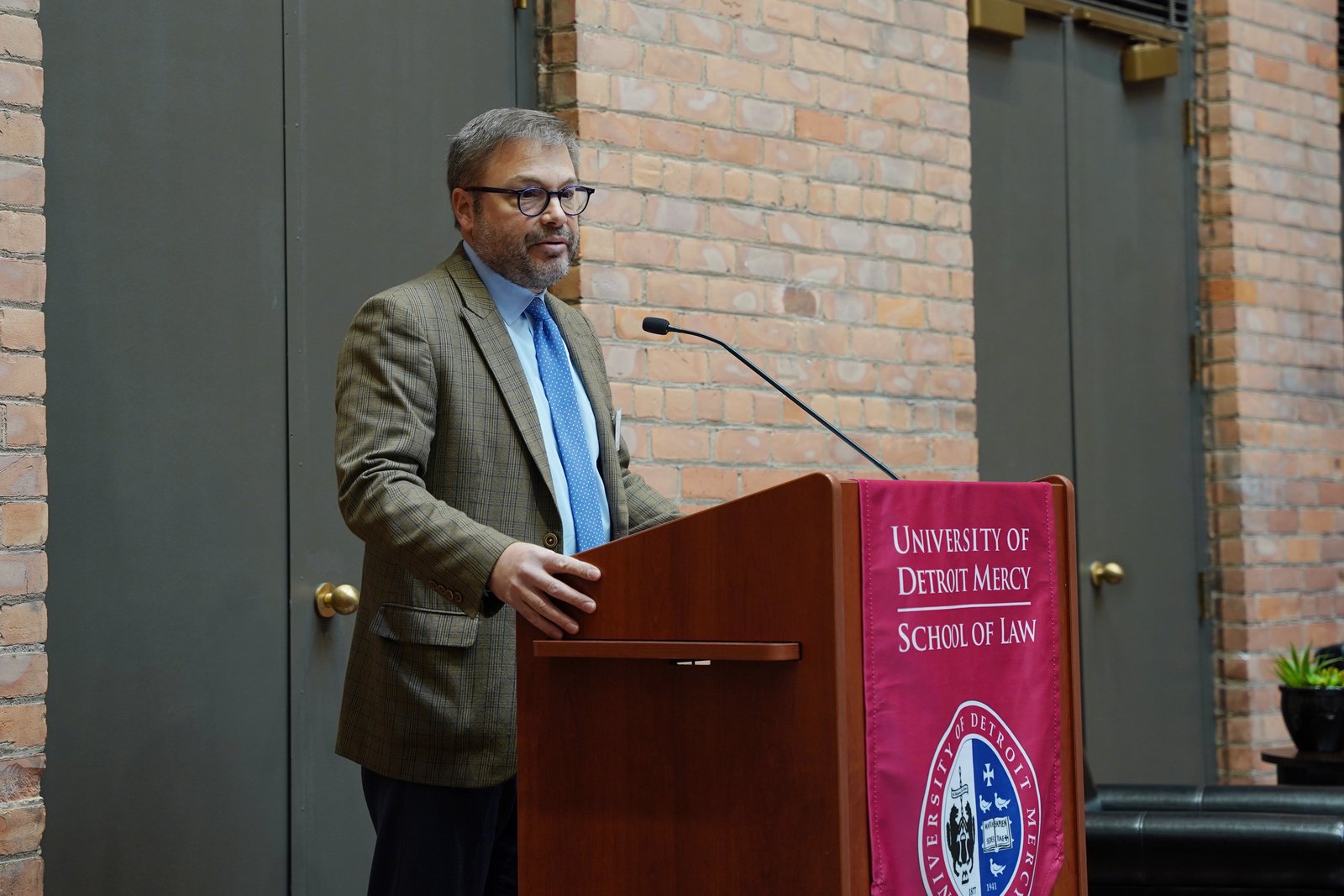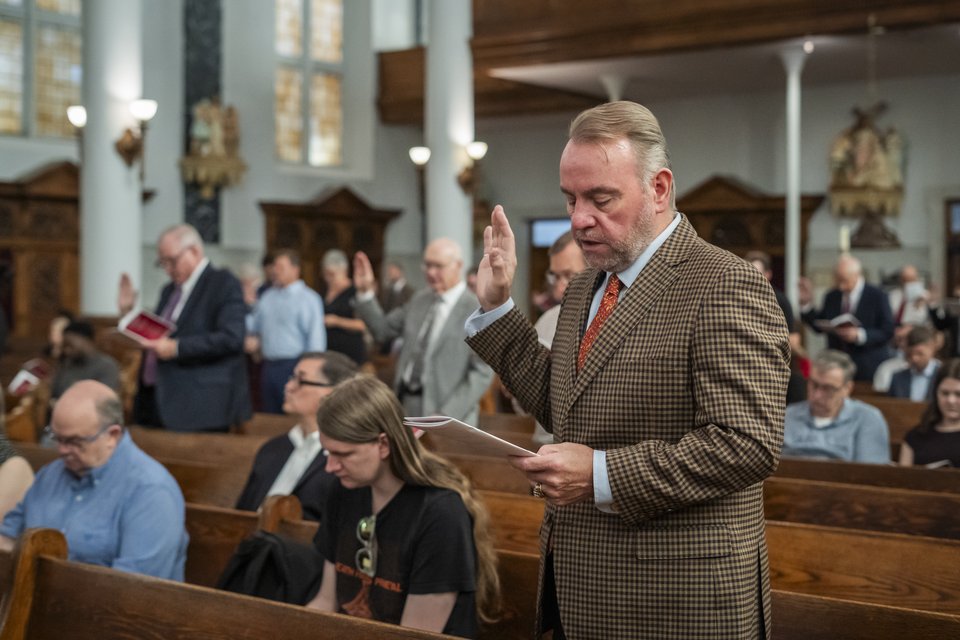Lumen Christi Institute partners with Archdiocese of Detroit to host legal symposium at University of Detroit Mercy
DETROIT — Lawyers, judges, corrections officers, law enforcement officials, ex-convicts, chaplains and others involved in the criminal justice system gathered Nov. 11 with a common goal in mind: creating a system that promotes restorative justice while showing mercy and compassion for all.
The criminal justice reform symposium at the University of Detroit Mercy's School of Law, “Doing Justice and Loving Mercy: A Community Conversation on Criminal Justice Reform,” was sponsored by the Chicago-based Lumen Christi Institute’s Catholic Criminal Justice Reform Network, which strives to "engage secular culture in dialogue using Catholic tradition and thought as a means to renew civilization by forming leaders for a global society in need of Christian wisdom."
The Lumen Christi Institute partnered with the Archdiocese of Detroit and the University of Detroit Mercy for a day of honest and frank conversations among those who have had different interactions with the criminal justice system.
Daniel Hourani is such an individual, having served 28 years of a life sentence in a federal penitentiary.
Hourani is now the director of community development for Team Wellness, the largest mental health organization in Michigan, and is on the board of the National Sheriff Association’s I.G.N.I.T.E. Program, which reduces violence and incidents in correctional facilities across 15 states.

Hourani spoke at the symposium with Judge Terrence Berg of the U.S. District Court of Eastern Michigan. It was Judge Berg, then a prosecutor, who convicted Hourani.
“Three years ago, I would not be doing this,” Hourani said. “I wouldn’t be in rooms like this, serving on these distinguished boards. Rather, I was serving a mandatory life sentence inside a federal corrections facility.”
Hourani and Judge Berg spoke about their experience with the criminal justice system — including Judge Berg’s own experience of being a victim of violent crime — and discussed ways the system can better value the human dignity of the accused, the afflicted, the incarcerated and those who serve in the country’s correctional facilities.
Despite being sentenced to life, Hourani worked on the life skills he would need were he to be released. He spoke of his experience building a program called Three Steps to Success, a 15-week class in which inmates accept culpability for their actions and form an action plan for personal growth.
As part of those efforts, Hourani reached out to Berg and the judge who sentenced him, informing them of the work he was doing to change the lives of inmates, including his own.
Soon, the sentencing judge began video conferencing with the Three Steps program.
"I got working with Judge Berg, filing for clemency in 2012 from President Obama, and Judge Berg wrote a letter in support of my clemency. That didn’t go through, but in 2020, when the First Step Act passed, I filed a motion for compassionate release, and Judge Berg supported me," Hourani said. "That is why we’re sitting before you.”
Hourani and Judge Berg’s conversation sparked table conversations at the symposium, where lawyers, law enforcement and former inmates spoke about what could be better done to create a more compassionate, ethical criminal justice system.

University of Detroit Mercy Law School Dean Jelani Jefferson Exum said the symposium was a chance for open and honest dialogue about creating was the school calls “the complete lawyer.”
“The complete lawyer is someone educated to the pursuit of justice, service to others, the highest legal standards of the profession and ethical behavior at all times,” Jefferson Exum said. “Today’s event is in line with our dedication to add a moral voice to the legal profession and to make space for dialogue that keeps human dignity as a central component to pursuing justice.”
Jefferson Exum encouraged attendees to join the Catholic Criminal Justice Reform Network, which connects those directly affected by incarceration who are committed to reforming the criminal justice system.
Detroit Archbishop Allen H. Vigneron, who was unable to attend the conference because of the United States Conference of Catholic Bishops’ fall meeting in Baltimore, wrote to the symposium participants, thanking them for the honest exchange of dialogue.
“I pray this gathering will facilitate a fruitful encounter between those charged with administering our criminal justice system and those most directly impacted by it, from former offenders and victims of crime,” Archbishop Vigneron wrote.
Magistrate Judge Anthony Patti, of the U.S. District Court of the Eastern District of Michigan, gave a keynote address on four considerations each and every person involved with the justice system must consider: Justice, mercy, suffering and dialogue.

Looking at each of these topics in light of the Gospel, Judge Patti said, can serve as a framework for discussing law and justice in a way that can be embraced by not only Catholics, but by other Christians and people of goodwill.
“The Catechism of the Catholic Church defines justice as the moral virtue that consists in the constant and firm will to give their due to God and neighbor,” Judge Patti said. “Justice toward God is called the virtue of religion. Justice toward men disposes one to respect the rights of each and establish human relationships and harmony that promotes equity in regard to persons and the common good.”
The law boils down to relationships — and the restoration of those relationships — between man and fellow man, and between man and society, Judge Patti said.
Often, justice falls short of a true restoration of these relationships, particularly for those who are injured by the transgression.
“I learned a very valuable lesson of this as a young lawyer, working on a case where a toddler was run over by a car,” Judge Patti said. “You can only imagine the suffering the child’s mother went through. We brought a lawsuit, litigated it well, negotiated hard and achieved in civil law what would be considered a miracle: I got the insurance company to pay more than the full policy.
“I’ll never forget the day the mother came to the law firm, and I handed her the check and proudly patted myself on the back, that I had done great justice for her,” Judge Patti recalled. “But she looked up at me and said, ‘All I want is little Crystal back.’ That was a hard lesson learned, but I learned it early in my career: the justice the law provides is quite imperfect.”

During the symposium, Detroit Catholic sat at a table with a former prosecutor-turned-judge, the chief of a police department, a social worker, two defense attorneys and a man who served 16 years in prison and now advocates for policy changes that can help citizens better reintegrate into society.
In order to encourage open and honest dialogue between the parties, Detroit Catholic agreed not to share the names of the people at the table.
A defense lawyer spoke about her experience defending a 17-year-old who was convicted of armed robbery after he pulled a gun on a woman at a gas station. The lawyer likened the victim to her own mother, but had to advocate for her client by telling his story. The perpetrator was coming from an unstable home and was still developing physically and mentally into an adult.
While the young man is now in prison, she said she hopes the system isn’t “throwing him away.”
The police chief added his department now has a social worker to help with people in need of assistance, but worries it is just “one more box to tick” of the many things expected of law enforcement officers, and wonders at times whether it is making an overall difference.
The man who was convicted and spent time in prison said he questions how law enforcement might be reformed when he feels it is rooted in a system designed to “throw poor people in prison.”
“There is no rehabilitation in prison; you can’t be rehabilitated to where you were before, you need to transform,” the man said. “I became more violent, more angry, more distressed in prison. The system doesn’t work. But when you get out, you work for minimum wage, and they expect you to be all changed.”

Conversations during the symposium were meant to exchange different viewpoints, to inform and be informed, not to debate, organizers said.
From a Christian perspective, criminal justice reform should be based on love, Judge Patti said. Although forgiveness doesn’t mean one forgets, and healing doesn't always lead to complete restoration, Judge Patti said everyone involved should be treated as a child of God.
“When we think about mercy, we think God is love,” Judge Patti said. “And in this love, God has created each of us with a soul and each soul is unique, unrepeatable and destined to live with all of us for all eternity. When we start with this premise that each person is a unique, unrepeatable soul, we then recognize that each soul is entitled to respect. From that recognition, we can talk about justice.”
Copy Permalink
Faithful citizenship Catholic colleges












